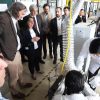By Dr. Jorge Carpinelli Pavisich, Director of Development and Innovation, Vice-Rector’s Office for Research and Development, Universidad de Concepción.
In a constantly changing world, the sophistication and diversification of the productive matrix are urgent needs for emerging economies such as Chile. Research and development (R&D) plays a crucial role in this challenge, but its true impact is seen when the knowledge generated becomes innovations that improve competitiveness, boost sustainable growth, and respond to society’s demands. This is where technology transfer and promoting science-based entrepreneurship are essential roles of 21st-century universities.
Universities aim to prepare highly qualified professionals and contribute to developing technological solutions that respond to current challenges. In this sense, Universidad of Concepción has demonstrated a solid commitment to creating innovation and entrepreneurship ecosystems, strengthening the ties between academia, industry, and the public sector. Through strategic initiatives, such as promoting tech startups and developing solutions based on applied science, a development model has been built that transcends the mere extraction of natural resources and aims to add value.
Recent cases illustrate this progress, from technologies that optimize water management during climate crises to innovations in advanced materials such as copper foil. Similarly, the promotion of technology transfer has allowed the creation of startups that incorporate artificial intelligence to face linguistic challenges or improve the security of critical infrastructures, demonstrating that science is an inexhaustible source of opportunities.
This issue of the journal highlights specific examples of this approach. It analyzes advances in using green hydrogen as an energy vector and its role in the sustainable mining revolution. Artificial intelligence projects to improve water security and ocean monitoring are also addressed, fostering more efficient decision-making in managing natural resources. At the same time, initiatives such as rainwater harvesting and seismic vibration measurement have opened new opportunities for disaster prevention and environmental resilience.
Efforts are also being made to reduce gender gaps in the technological field and promote women-led entrepreneurship, a key priority in building a more equitable and inclusive innovation ecosystem. In addition, projects such as creating open software in astronomy and developing space exploration technologies are highlighted, demonstrating the diversity of applications that arise from the ties between science and industry.
Innovation is not a luxury or a secondary option for universities; it is imperative for those institutions that seek to respond to current and future demands. Fostering a science-based innovation and entrepreneurship culture will improve our economy’s competitiveness and contribute to building a more resilient and sustainable society. The University of Concepción reaffirms its commitment to this mission, convinced, looking to the future, that research and development can and should be motors of social welfare and economic growth.
Last modified: 6 de marzo de 2025





